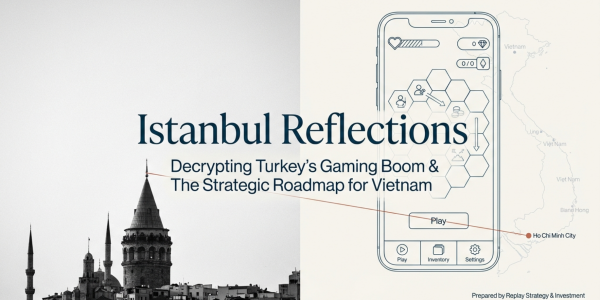The UK’s Gaming Renaissance and Growth
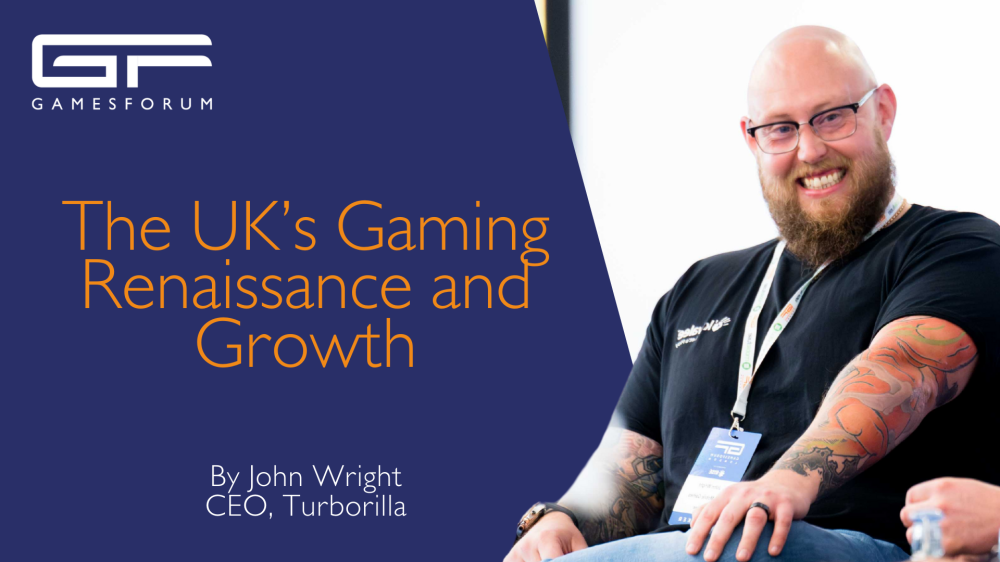
Ladies and gentlemen, how are we all doing? Recovered from Gamescom and ready for the next big event in the gaming industry calendar? Yep, you’re right, Gamesforum London is less than 3 weeks away so what better thing to write about then the current UK gaming landscape in 2025.
We’re witnessing a formidable convergence: on one side, mobile is continuing to grow and be ever more impactful, and on the other, the depth and innovation of PC and console development is definitely being felt across the country, especially in the Indie space. But underpinning it all is something far larger, proven economic momentum and government changes that are actually making a difference, creativeness is being felt more than ever and it’s all coming together in perfect harmony. God bless you Blighty.
A Market on the Move
Every good article needs numbers, so let’s start with the topline. Globally, video games generated $187.7 billion in revenue in 2024, edging towards the $200 billion mark in 2025. Mobile continues to dominate, accounting for roughly $92 billion, or half of the overall total.
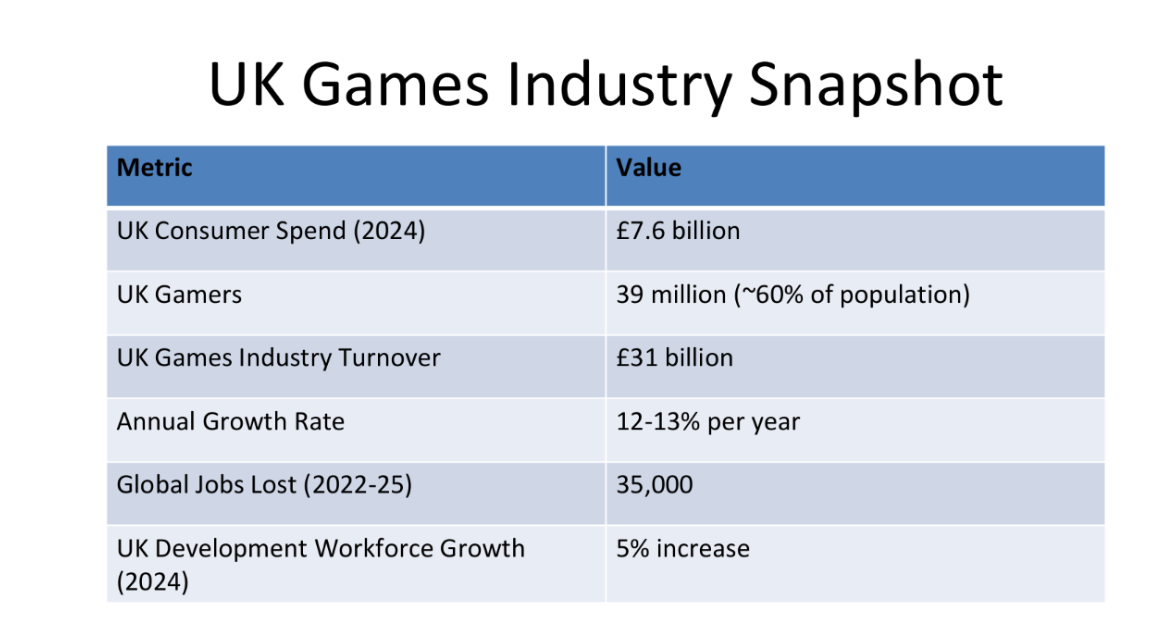
Now, let’s drill down to the UK consumer spend, which hit £7.6 billion in 2024. With a population of 69 million people, that means every single person in the UK is spending £110 annually or, more than likely, I’m spending too much and increasing the averages. Overall, it makes the UK one of the top 10 gaming markets by revenue, with over 39 million gamers, around 60% of the population actively engaged in playing games regularly.
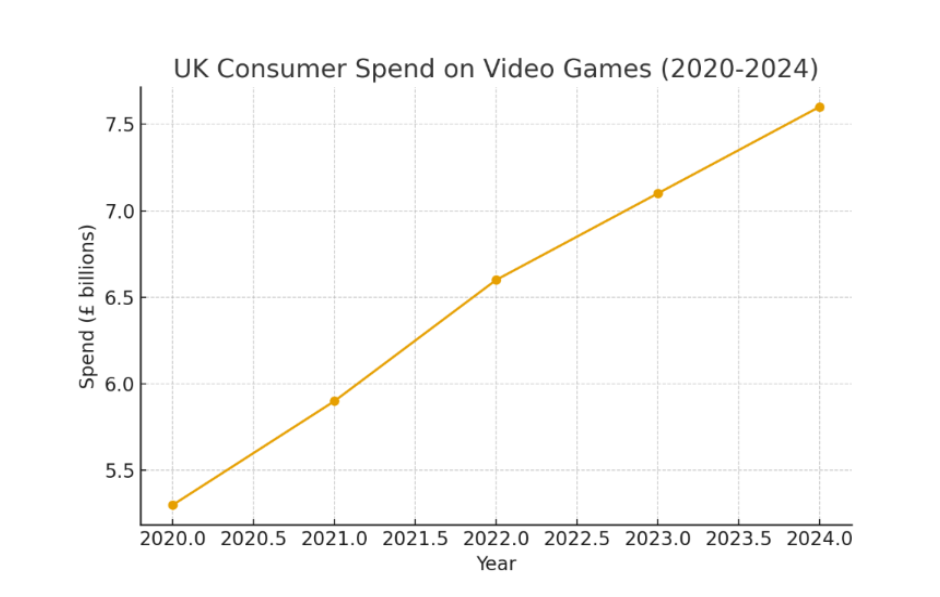
Meanwhile, the broader UK video games sector sees £31 billion in annual turnover, growing at 12–13% per year and supported by over £650 million in investment, which included the most recent acquisition of NextBeat by Duolingo - shout out to Simon Hade and team for making this super interesting event happen!
Platforms in Dialogue
Mobile games are king, both at home and abroad. But, there’s more to the story: an estimated 79% of gamers play on mobile, and a significant 42% also engage on PC or laptops, while 55% split time with consoles. This clearly shows that cross platform is happening already and, as I’ve spoken about in previous articles, one of the clear futures of how people game. This gives them the ability to play in whatever way or environment they choose.
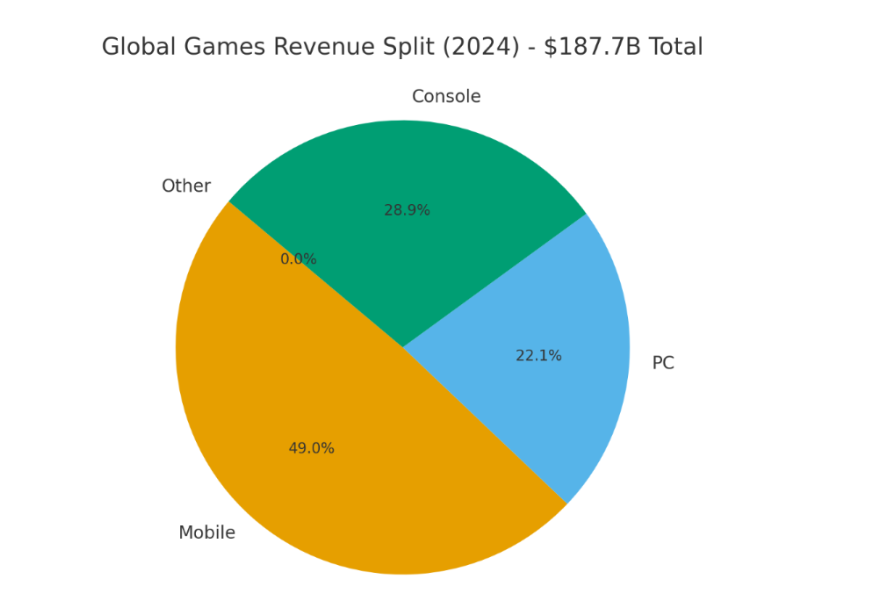
PC gaming, which contributed around $41.5 billion in 2024, has cooled into a $37.3 billion figure by Q1 2025, but forecasts still expect growth, potentially reaching $76–77 billion by year-end . This enduring strength, paired with mobile’s flexibility, forms the dual engine of the industry.
Government Level Up: Strategy Meets Support
Let’s talk about maybe the most positive thing to happen in UK gaming for the past few decades. Just two months ago, the UK Government made a bold move: a £30 million “Games Growth Package”, disbursed at £10 million per year over three years, was unveiled to fuel early-stage studios and prototype innovation through the UK Games Fund and its ecosystem. Complementing this is the newly minted UK Video Games Council (chaired by the one and only Nick Button-Brown), which meets regularly with ministers to shape the growth agenda.
This is part of a broader creative industry strategy, which sees £380 million allocated to creative sectors, including games and £150 million towards “Creative Places” regional investment. And at the grassroots, Culture Secretary Lisa Nandy delivered £60 million to bolster creative initiatives, including video games, while pushing to reintegrate arts and game design into school curricula.
Now, isn’t that good news? The government is putting their money where their mouth is and finally understanding that for us to continue to grow as an industry in the UK, they need to give better financial aid and support to companies - especially entrepreneurs who are looking to start new businesses… FINALLY. Finland, Turkiye, France etc. have been doing this for years, now it’s our turn to make it easier for gaming founders.
London’s Calling (to a faraway land)

The big smoke - my home town - and, the best city in the world, is starting to claim its title as Europe’s gaming hot spot. Under Games London, the city hosts more than 700 gaming companies, with 13,700 professionals, and contributes £1.4 billion to the economy. Major studios like Supercell, King and Rocksteady stand alongside indie legends like Poncle (Vampire Survivors) and the London Games Festival has catalyzed over £110 million in direct sales to date - not bad for a city of 11m people!
Politics aside, one thing mayor Sadiq Khan is getting right is that he has pledged £10 million extra to boost London’s creative industries, including an estimated £17 million targeted at gaming’s continued ascendancy.
Beyond Deals: Creative Brilliance and Industry Resilience
This is where the magic lives, the sheer talent and resilience of the people, you don’t have to be born on an East London council estate like me to call this amazing city home, you can be from anywhere around the world, move here and become part of it very quickly. Let’s consider UK conservative estimates: the games development workforce grew nearly 5% in the 12 months to May 2024, even as global markets faced headwinds. Developers are embracing change, this can be seen with AI, Live Ops, subscription models, PvP innovation, and hooks into AR/VR to boost engagement.
Yet challenges persist. The decline of physical game sales, a 35% drop in boxed game sales in 2024, now representing just 10.4% of new game sales, shows how digital dominance is reshaping distribution and retail. Meanwhile, industry-wide layoffs continue, a harrowing 35,000 jobs lost globally between 2022 and May 2025. Particularly in the UK, concerns swirl around an entry level pipeline that’s drying up, making it harder for newcomers to break in, even as the first generation of UK developers begins to retire. I can talk from personal experience that this is a massive concern for me, and before I left Kwalee we actually launched a student programme with Warwick university to try and prevent a big industry issue in a few years, and I wholeheartedly suggest other UK gaming companies make the same calls.
Still, the bad doesn’t overshadow the core truth: UK creative talent remains unmatched. Narrative designers, coders, composers, guardians of immersive beautiful worlds, are distributed across London’s studios and throughout hubs in Leamington Spa, Dundee, Guildford, Manchester, and beyond and I am very happy about this.
Final Thought
So, here’s the thing, folks, the UK games industry isn’t just ticking along anymore, it’s properly thriving. We’ve gone from being the scrappy underdogs to actually having huge companies all wanting an office here, and that’s down to talent, resilience, and finally some government backing that doesn’t feel like an afterthought for once. You can feel the momentum when you talk to founders, when you walk around studios, or when you see London buzzing with more gaming energy than Berlin or Paris. We’re not playing around anymore, we’re here to play and win.
But look, momentum is fragile. If we want this to be more than just a purple patch, and another bubble, we need to double down: nurture young devs, give indies the oxygen (funding) to take risks, and make sure the UK keeps feeling like the best place in the world to make and work in games. Do that, and in five years’ time we won’t be calling this a renaissance. We'll be calling it the golden age of UK gaming. And honestly, I don’t know about you, but I can’t bloody wait. Now, if West Ham can just not get related this season I’ll have even more to celebrate. Come on you Irons!




